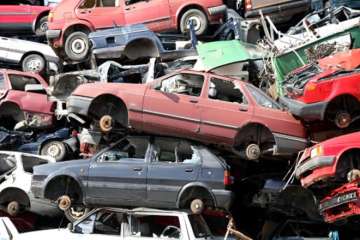Vehicle scrappage policy may bring in stricter fitness norms for pre-2005 built vehicles
As per estimates, there are about 2 crore pre-2005 built vehicles that are plying on Indian roads and the move is aimed at de-incetivising such vehicles in view of about 10 to 25 times higher pollution emission by them under the new emission norms.

The much-awaited vehicle scrappage policy that has gone for a Cabinet approval is likely to see stringent registration and fitness norms for pre-2005 manufactured vehicles, according to sources.
As per estimates, there are about 2 crore pre-2005 built vehicles that are plying on Indian roads and the move is aimed at de-incetivising such vehicles in view of about 10 to 25 times higher pollution emission by them under the new emission norms.
Last week, Road Transport and Highways Minister Nitin Gadkari said that he had cleared a Cabinet note on the proposed policy and a decision is expected soon on it.
Indian vehicle market has grown exponentially. If old pollution norms are compared with new emission regulations, pre-2005 vehicles are polluting 10 to 25 times more under the new norms, sources said. Even if those old vehicles are maintained properly, they will be polluting more with more emissions and will prove to be a hazard for road safety.
"The proposed policy may see the imposition of certain compliances like increased registration charges for private vehicles and increased fitness certification charges for transport vehicles... There may be provisions in the proposed policy to de-incentivise such vehicles," the sources added.
Given the proposed stringent norms that include fitness certificate requirement every year for transport vehicles, a significant number of such vehicles will certainly opt for vehicle scrapping, they said.
Besides, the government is also planning for a mechanism for a safe disposal system for pollutants that include AC - CFC - a liquid refrigerant composed of chlorofluorocarbons (CFCs), that are found to emitting greenhouse gases which harms the ozone, according to the sources.
Besides the policy may contain a mechanism to deflate airbags scientifically besides dispolal of noble metals in the silencer and rubber etc parts in an eco-friendly manner.
"The oil ECT just can't be thrown on earth. These should be disposed of scientifically," the source said adding, the steel ministry is working on scrapping centres and the Ministry of Road Transport and Highways will authorise those centres and will have access to he data base of vehicles to check forgery.
The policy, if finalised, may have provision that on scrapping of old vehicles, buyer of new vehicles could be given concessions by dealers on the basis of certificates of vehicle scrapping, the sources said.
In two years time, the transport ministry is planning to create automated fitness regime in which no manual intervention would be required to check corruption. It will also work on making the fitness regime objective, rational and scientific.
Last week, Gadkari said: "I have signed the file for the cabinet note on the policy for the scrapping of old vehicles. The finance ministry has approved the note on it."
He said the note will now be circulated to ministries concerned and the Cabinet was likely to take a call on it soon.
He had added that the proposed policy once approved will be applicable on all vehicles including two and three-wheelers.
Earlier, the policy had gone for a fresh round of consultation with the stakeholders on the direction of the PMO.
The minister had earlier said that once the policy is approved India could emerge as a hub for automobile manufacturing as key raw material available from scrapping like steel, aluminium and plastic are bound to be recycled, bringing down automobile prices by "20-30 per cent".
In May 2016, the government had floated a draft Voluntary Vehicle Fleet Modernisation Programme (V-VMP) that proposed to take 28 million decade-old vehicles off the road.
A committee of secretaries (CoS) recommended to the ministry redesigning of the scheme for greater participation of states with partial support from the Centre.
The CoS had suggested that the "scheme may dovetail a calibrated and phased regulatory approach for capping the life of vehicles together with stricter implementation of emission norms" and accordingly a revised consultation paper got in-principle nod at PMO.
The government on July 26 this year had proposed amendments to motor vehicle norms to allow scrapping of vehicles older than 15 years in a bid to spur adoption of electrical vehicles.
In a draft notification, the government proposed renewal of fitness certificates for vehicles older than 15 years every six months instead of the current time-frame of one year.
The notification also provided that the newly purchased motor vehicles will be exempted for the payment of fees for registration certificate and assignment of new registration mark if the purchaser produces scrapping certificate of the previously owned vehicle of the same category issued by the authorised scrapping centre/agency.